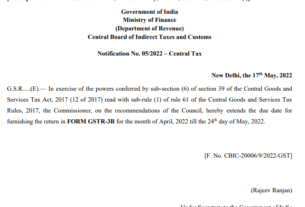07.04.2018: With a view to removing any doubt or uncertainty in the matter and bring uniformity in the rate of GST applicable to the supply of food and drinks made available in trains, platforms, or stations, it has been clarified with the approval of the competent authority that the GST rate on supply of food and drinks by the Indian Railways or Indian Railways Catering and Tourism Corporation Ltd. or their licensees, whether in trains or at platforms (static units), will be 5% without the input tax credit.
Different GST rates are being applied for mobile and static catering in Indian Railways which is presently leading to a situation whereby the same licensee (selected by Indian Railways/IRCTC) supplying the same food would be subjected to different GST rates depending on whether it is mobile or static catering, as also which variant of mobile
catering it is [pre-paid (without option), pre-paid (with option) or post -paid]. The rate difference is resulting in the same food being supplied at two different rates to the railway passengers, which is anomalous.
The passenger is not aware of the GST rate applicable to the food ordered by him/her. This may also lead to unnecessary litigation and thus further strengthens the need for uniform application of tax rate in respect of food and drinks in/by Railways.
With a view to remove any doubt or uncertainty in the matter and bring uniformity in the rate of GST applicable for all kinds of supply of food and drinks made available in trains, platforms or stations, it is clarified with the approval of GST Implementation Committee , that the GST rate on supply of food and/or drinks by the Indian Railways or Indian Railways Catering and Tourism Corporation Ltd. or their licensees, whether in trains or at platforms (static units), will be 5% without ITC.
Notification ref. F.No. 354/03/2018 -TRU dt.31.03.2018
Similar Articles at GST India
GST Rate on Mineral Water
The mineral water is purified packaged water that is sold in PET bottles. Find out the GST rate charges on the sale of such drinking water in India. more
SAC code list in GST
Are you a supplier of Services?. If yes there, here is the complete list of SAC codes that you must check before sending the GST invoice to your recipient. more
News on GST In India
Want to get the latest news on GST in India?. If yes, Subscribe to our free newsletters, which will be delivered directly into your inbox. Read and stay up to date on GST. more
Debit note and Credit note format in GST
Download the debit note and credit format in excel that can be used for GST purposes. See how the debit and credit should be booked under GST in India. more


